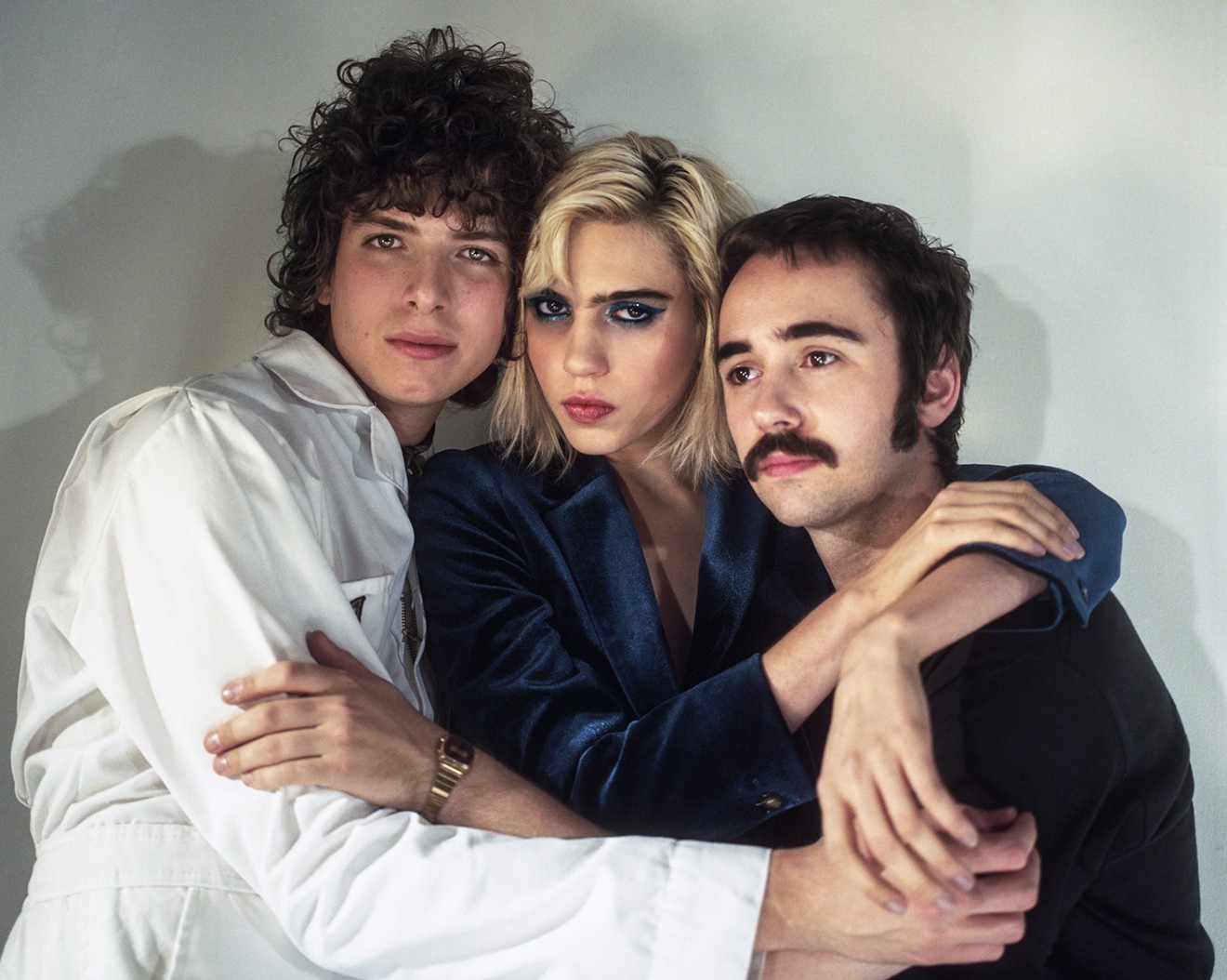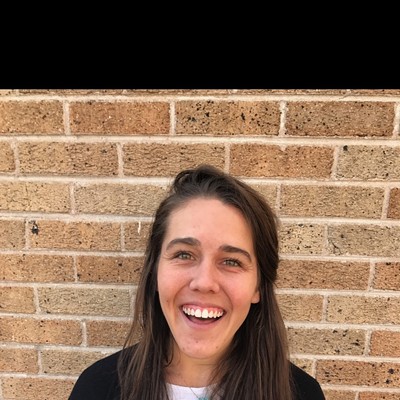Sunflower Bean, the New York City-based indie-rock trio playing the main stage at this year's Westword Music Showcase, Saturday, June 23, doesn't shy away from sounding different. The group began performing in the DIY scene around 2013, dropped its first full-length, Human Ceremony, in 2016, and released its second album, Twentytwo in Blue, this March.
For the latter album, the band wanted to focus on songwriting and give each track proper time and space to develop. Vocalist/bassist Julia Cumming describes Sunflower Bean as the musicians' "way of dealing with reality."
"As we're writing, we're writing out our experience," Cumming says, "the experience of being a young person in the United States and what that might mean right now — emotionally, and what you need from yourself to survive. The resilience that is inside all of us is kind of hard to find."
We spoke with Cumming, drummer Jacob Faber and guitarist/vocalist Nick Kivlen over the phone to discuss their new album, the influence the DIY scene has had on their music, and how they use their platform as musicians to make an impact.
Westword: How do you think your sound has evolved from your first project to the second?
Julia Cumming: We were inspired a lot by DIY, which is the scene we have come out of. We wouldn’t really be the musicians the way we are without it. Definitely, we were really inspired by DIY and a lot of bands coming out of the scene, but at the same time I think we have always had this part of ourselves that really wants to go against the grain. As much as we were inspired by DIY, we were also doing guitar solos and getting down on the floor and jumping into the crowd. Everything was very much shoegaze. In a certain way, it has made it so we never fit right into a scene. We’re not really emo; we’re not really all these things. We’re just kind of going to the beat of our own drum a little bit and trying to push ourselves, even against ourselves. We saw what we did on Human Ceremony, and we wanted to be able to even push further than that and get away from some of these chorus-y guitar tones and try to enter into what could be considered more classic songwriting. We don’t ever want to repeat ourselves. We don’t ever want to do what everyone else is doing.
Jacob Faber: We have the freedom to not have to box ourselves in, in any sort of way. Especially for Twentytwo in Blue. That really let us follow every creative path that we felt strongly about and really [get] to seek those things out. It became a very creatively fulfilling project.
Going along with not really fitting into any scene, New York seems like kind of the perfect place for that in terms of being able to find whatever works for you. How much of an impact do you feel the city itself has had on your growth as a band?
Nick Kivlen: I think you’re 100 percent right on the fact that in New York City, you can really be whoever you want to be. There are a lot of very niche communities; there are so many people marching to the beat of their own drum. No one is going to judge you, really, for doing whatever you want to do. Whether it’s performance art or rock music or visual art, there is so much variety in New York.
I think immediately, the Brooklyn DIY scene that was happening in early 2010 was a huge influence on all of us. We were playing at DIY events with all these different DIY bands, and it felt like a special period in New York music history. There was sort of a laid-back feeling. A lot of people just making art, making music and just hanging out. There were specific [venues] in Williamsburg that I’m thinking of — Death by Audio, 285 Kent and Glasslands. They were all on the same block. You could just go there any night of the week, hang out and meet other people who are making music and making art. It was just a real social scene back then, and it definitely influenced us a lot.
How does activism tie into your music?
Cumming: I think with the record [Twentytwo in Blue], one thing about the politically charged aspect of it — people asked us if we were making a protest record. To that, I think we responded in that you can take it however you want to take it, but there are definitely points on the record that talk about what’s going on — on “Crisis Fest” very blatantly, and then it weaves through a lot of the other songs in other ways.
I think when it comes to activism, it’s almost similar in the way that we are really interested in, and I’m really interested in, what it’s like to let activism be a part of your life and be a part of your artwork without it also being the only thing or the only identifier. For activism to be something that you’re really engaged in, you have to figure out how to make it work for your life, what you love and your skill set so that you can express it every day. You can express it rather than just going to a protest when something tragic happens. It’s finding out how you can use you more to make the world a little bit better. I think that that’s how we approached it on the record and how I approach it in my personal life, which was by starting this group, [Anger Can Be Power]...
We’re free-form and respond to what is going on. Our last event was literally about youth activism in New York City that maybe isn’t getting a ton of national attention. So it was about kids that work for anti-gentrification groups in the Bronx and talk about the fact that New York City public schools are still extremely segregated, and the difference in the quality of education that kids get in schools that are predominantly white or predominantly black. I’m trying to use what I have as someone who has been a part of throwing and attending live music for many years. I’m trying to bring that to the world of activism and go out of my comfort zone a little bit.
Why do you think music is a good platform to raise awareness? Awareness is just so key in a lot of these issues, and music definitely reaches a lot of people. Were you witnessing other artists who would tie in social justice to their music? How did that start?
Cumming: I think with any kind of art, it’s to develop your artistic voice and develop all these things depending on your amount of privilege that’s done in various amounts of leisure. People have this choice of whether or not they want to engage with that. I think that music and the arts are generally what gives life flavor and [an] experience. It kind of takes you out of the mundane. People consume it to feel and help them understand their emotions. Usually with music, you’re looking for something that can help you make sense of things and help you make sense of what is going on. I think to be nuanced and to bring some of your politics to that at a certain point is very natural, because people want to consume it as an art form; it’s communication.
Kivlen: I also just wanted to make the point that all art and all music is currently political, no matter what. Even the choice to make music that you might think is apolitical is a political statement in and of itself. I think that artists have a responsibility to talk about things that affect people’s lives.
Sunflower Bean performs at the Westword Music Showcase at 2 p.m. Saturday, June 23, on the Mike's Hard Lemonade outdoor stage. Get information and tickets at westwordshowcase.com.
[
{
"name": "Air - MediumRectangle - Inline Content - Mobile Display Size",
"component": "12017618",
"insertPoint": "2",
"requiredCountToDisplay": "2"
},{
"name": "Editor Picks",
"component": "17242653",
"insertPoint": "4",
"requiredCountToDisplay": "1"
},{
"name": "Inline Links",
"component": "18838239",
"insertPoint": "8th",
"startingPoint": 8,
"requiredCountToDisplay": "7",
"maxInsertions": 25
},{
"name": "Air - MediumRectangle - Combo - Inline Content",
"component": "17261320",
"insertPoint": "8th",
"startingPoint": 8,
"requiredCountToDisplay": "7",
"maxInsertions": 25
},{
"name": "Inline Links",
"component": "18838239",
"insertPoint": "8th",
"startingPoint": 12,
"requiredCountToDisplay": "11",
"maxInsertions": 25
},{
"name": "Air - Leaderboard Tower - Combo - Inline Content",
"component": "17261321",
"insertPoint": "8th",
"startingPoint": 12,
"requiredCountToDisplay": "11",
"maxInsertions": 25
}
]













